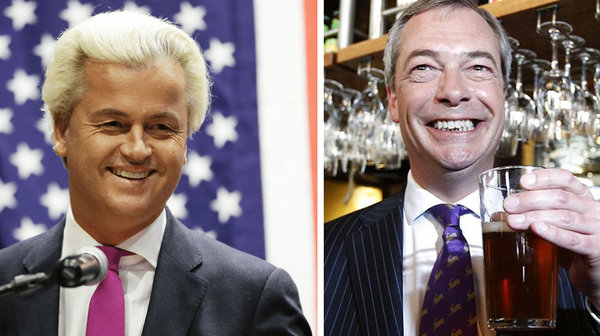Donald Trump Boosts Europe’s Anti-Establishment Movement
Donald Trump Boosts Europe’s Anti-Establishment Movement
Donald Trump’s electoral victory has come as a shock to Europe’s political and media establishment.
Soeren Kern | Gatestone Institute | November 13, 2016
Donald Trump’s electoral victory has come as a shock to Europe’s political and media establishment, which fears that the political sea change underway in the United States will energize populist parties in Europe.
Anti-establishment politicians, many of whom are polling well in a number of upcoming European elections, are hoping Trump’s rise will inspire European voters to turn out to vote for them in record numbers.
Commenting on Trump’s victory, Dutch lawmaker Geert Wilders, wrote: “America has just liberated itself from political correctness. The American people expressed their desire to remain a free and democratic people. Now it is time for Europe. We can and will do the same!”
More than a dozen elections will be held in Europe during the next twelve months, beginning with a re-run of the Austrian presidential election scheduled for December 4. Polls show that Norbert Hofer of the anti-immigration Austrian Freedom Party is on track to win that race.
Also on December 4, Italians will vote in a referendum on reforming the constitution. Observers say Trump’s victory will make it more difficult for Italian Prime Minister Matteo Renzi, one the few world leaders to publicly endorse Hillary Clinton, to prevail. They say Renzi’s open support for Clinton will hurt Italy’s relations with the United States. Renzi has said he will resign if he loses the referendum, which calls for curbing the role of the Senate. Most opinion polls show the ‘no’ camp ahead. Renzi says the move will simplify decision-making, but opponents say it will reduce checks and balances.
General elections are scheduled in 2017 for France and Germany, the two most important countries of the European Union, where anti-establishment candidates are challenging the established order.
Mainstream politicians and the media have sought to discredit populist leaders by branding them as neo-Nazi and xenophobic for their opposition to mass migration, multiculturalism and the rise of Islam in Europe. If Donald Trump can demonstrate that he is able to govern the United States and produce tangible results, especially by growing the economy and curbing illegal immigration, Europe’s political establishment will have a much harder time stigmatizing dissenters.
What follows is a selection of official European reactions to Trump’s election victory. Anti-establishment politicians have embraced Trump, while establishment politicians have mostly issued pro forma congratulatory statements that are polite but formal and distant.




